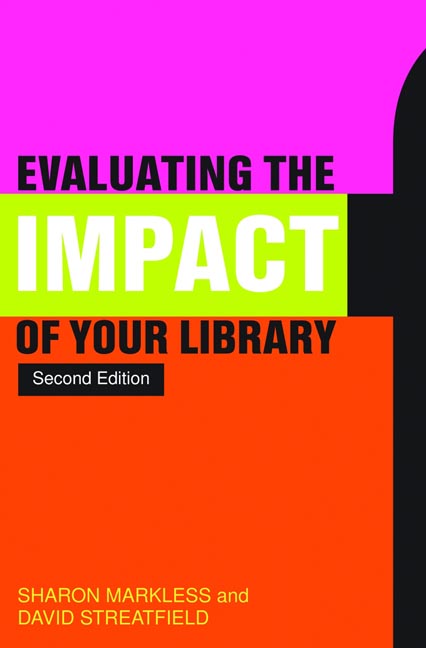Book contents
- Frontmatter
- Dedication
- Contents
- Introduction
- About the authors
- Impact and all that: use of some key terms in this book
- Part 1 The Context
- 1 The demand for evidence
- 2 Getting to grips with impact
- 3 The research base of this work
- Part 2 Evaluating Impact
- Part 3 The Bigger Picture
- References
- Notes
- Index
- Evaluating and Measuring the Value, Use and Impact of Digital Collections
- Measuring Library Performance
- Miscellaneous Endmatter
1 - The demand for evidence
from Part 1 - The Context
Published online by Cambridge University Press: 08 June 2018
- Frontmatter
- Dedication
- Contents
- Introduction
- About the authors
- Impact and all that: use of some key terms in this book
- Part 1 The Context
- 1 The demand for evidence
- 2 Getting to grips with impact
- 3 The research base of this work
- Part 2 Evaluating Impact
- Part 3 The Bigger Picture
- References
- Notes
- Index
- Evaluating and Measuring the Value, Use and Impact of Digital Collections
- Measuring Library Performance
- Miscellaneous Endmatter
Summary
If you are interested in the impact of your library services, or of library services in general, you may like to start by reflecting on where the impetus towards impact evaluation is coming from and how that impetus can itself distort the picture. These issues are explored below. However, if your concerns are purely practical please go on to Chapter 4.
Why is evidence of impact an issue for libraries (and information services)?
Picture a group of scholars working in the Library of Alexandria in about 50 BC. Now assume that they have been ferried forward in time and deposited in your library today. Will they identify their surroundings as a library? More specifically, will the scholars recognize the printed publications at the heart of your library as equivalent in some way to their scrolls? If so, it seems likely that they will know their surroundings as a library. But what happens if we ship them forward another 30 years and touch them down again? Will your library still be there? Will it be recognizable as a library? Will information technology and the demand for different kinds of interaction between library staff, users and the service have transformed the library beyond recognition?
Even the most sensitive crystal ball is unlikely to offer a clear picture of libraries 30 years hence because of the accelerating rate of change. However, if we can start to gauge the changes in the impact of various services, this will give us an indication of where things are going and help in managing the changes needed to get there.
We don't have to look 30 years ahead to make a case for looking at impact. One common feature of all types of libraries is that there is too much to do and too little time. ‘Traditional’ performance indicators are important for enabling you to tell whether aspects of a service are working efficiently. However, when a new initiative or project is undertaken, this is usually achieved by prising precious time away from other operational activities. If this is the case, it is doubly important to know whether the innovation is working and how. More specifically, are you using this precious time well? How can your innovation be made to work better?
- Type
- Chapter
- Information
- Evaluating the Impact of Your Library , pp. 3 - 22Publisher: FacetPrint publication year: 2012



